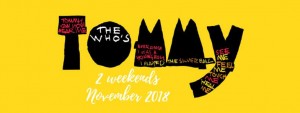 As anyone who attends plays regularly knows, community theater is the biggest of crapshoots. Due to the limitations of space, resources, money, manpower and talent base, each production has a host of hurdles to overcome before it gets to opening night.
As anyone who attends plays regularly knows, community theater is the biggest of crapshoots. Due to the limitations of space, resources, money, manpower and talent base, each production has a host of hurdles to overcome before it gets to opening night.
Because of this, I typically expect certain things when I attend community theater: small casts a wide range of experience, traditional sets and basic direction, to name a few.
Which makes Bristol Theatre Company’s new production of The Who’s Tommy so unusual. Because it delivered something I honestly WASN’T expecting: a truly impressive theater experience.
Tommy follows the story of the Captain and Mrs. Walker (Kevin Silva and Julian Trilling, respectively), whose life of domestic bliss is shattered when the Captain goes missing in action during WWII. Thinking him dead, Mrs. Walker moves on with another man (C.J. Gerhard), but when the Captain returns unexpectedly, embarrassment soon turns violent, and deadly. When the two adults realize that their son Tommy (Logan Cabral, Myles Napolitano, and ultimately Mike Daniels) has witnessed the whole ordeal, they admonish him that, “You didn’t see it, you didn’t hear it. You won’t say nothing to no one, never in your life.” The young boy takes these directives to heart, and he becomes deaf, blind and mute. As he goes through life, he is abused by family members and strangers alike, until he is revealed to be a prodigy at pinball. And that … is where the story starts to get a bit weird.
The convoluted plot of this show is only one of the many challenges theater companies must face when they attempt to mount it. As a rock opera, The Who could introduce characters and songs once, only to have them disappear, trusting the liner notes and the listener’s imagination to fill in the blanks. But adapting the story to the stage requires massive narrative chunks filled in with moving performers and set pieces, often without time for dialogue. On top of that, you need a large cast, a full rock band and even a pinball machine. In other words, Tommy is a hefty undertaking for any theater, under any circumstances.
Which makes what Bristol Theatre Company has pulled off here all the more impressive. Director Greg Geer has compiled a cast of 22 performers (by my count, at least; it was hard to be sure), and moves them swiftly and adeptly in, around and across their large set. While the leads (including all three Tommys) stay in one role throughout the show, everyone else is constantly changing costumes and characters as they hurtle from scene to scene, song to song (hat tip to stage manager Bethany Whitehead and props master Dena Vezina for keeping tabs on all those moving parts). The net effect of all this movement was a real sense of flow that truly propelled the show along.
Of course, in a play based on a rock opera, the real gauge is the music. The pit band, led by keyboardist and conductor Alex Tirrell, were perhaps the hardest working people in the entire production. Recreating the music of one of best rock bands of a generation (not to mention the impossibly complex guitar work of Pete Townshend) is extremely challenging, and it was very impressive to see how well this group of musicians (including Jon Patrick Brennan, Benjamin Lee Tirrell, Matt Lombardi, Chris Caduto and Ryan “Buddy” Procopio) gelled together to provide the skill and energy needed for the show to work as well as it did.
Finally, the performers themselves have just as big a challenge, attempting to flesh out characters from what can be very light source material, all while maintaining the extreme demands of the score. All three of the main leads (Mike Daniels as Tommy, Julian Trilling as Mrs. Walker, and Kevin Silva as Captain Walker) have standout moments where they truly shine, but the rest of the cast more than capably holds their own, whether they only have a couple of lines, or an entire song to dig into. For my money, the unquestioned highlight of the show was Katie Silva just singing the hell out of “Acid Queen.”
Even all of these great components doesn’t necessarily add up to the audience fully taking in everything that happens. Through no fault of anyone in the production, the combination of loud music, a large space and fast-sung lyrics make it challenging to understand the story at times. For this reason, I highly suggest you either give the album a listen, or at least read up on the story ahead of time, so that you can focus on the spectacle in front of you.
Community theater can be hit or miss. Luckily, The Who’s Tommy is a success that those involved should be proud of, and those attending will greatly enjoy.
The Who’s Tommy runs through Nov. 17 at Bristol Theatre Company, 235 High Street, Bristol. bristoltheatrecompany.org; 401-338-0900
More Posts by The Author:
The Gamm’s JQA Provides Hope in Tumultuous Times
Granite’s La Mancha – An Outpouring of Community
The Players at Barker Have it and Flaunt it with a Pleasing Producers
Good Game Grill Brings Board Game Fun to the Masses
Don’t Hate the Player: Board games to play with the people you love


